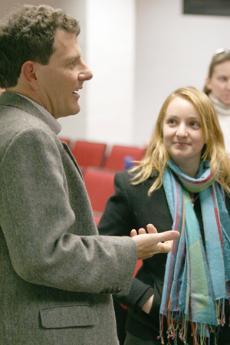
Matt Moore
Nicholas Kristof is no stranger to experience.
He’s reported on wars. He’s traveled to 120 countries. He lived to tell about an encounter with an Indonesian mob carrying heads on pikes.
He even won a Pulitzer Prize, along with his fellow journalist and wife, for the coverage of the Tiananmen Square protests of 1989, where hundreds of civilians were killed in China during a protest against corruption in the Communist Party.
But standing in front of a packed Nelson Auditorium audience Tuesday night, he told listeners that none of these experiences quite affected him on such a personal level bout a change in the way politicians react to the genocide.
“There aren’t any easy solutions, but there are things that we can do as citizens,” he said. “If there is political pressure on Bush, he will do more. If congressmen get enough letters, they will start to do something. I’m afraid things are more likely to go the other way.”
Candice Epps, a senior in science education, said hearing about the genocide from someone who had experienced it firsthand really helped to put the events in perspective.
“Based on what he said, and the stories he told from when he was in Darfur, it gave a personal perspective, and made it seem more real,” Epps said.
Kristof highlighted the plight of rape victims in Darfur who are too afraid of the shame and social stigma attached to rape to report the incidents.
“Rape is an issue of shame that people don’t really talk about,” Kristof said. “These incidents of rape aren’t a by-product of war. There is a policy of rape, because they can use it terrorize the people. Women who report that they were raped are often held for fornication. They would never take a woman’s word.”
While many rape victims don’t report what they have been through, Kristof said that there are some who do, and that they should inspire others.
“We have nothing to lose by speaking out,î Kristof said. ìThese people do, and yet they [speak out] anyway. It really gives me hope for humanity.”
Kristof’s work in Darfur earned him his second Pulitzer Prize in 2006, which, according the Pulitzer Board, rewarded him for “his graphic, deeply reported columns that, at personal risk, focused attention on genocide in Darfur and gave voice to the voiceless in other parts of the world.”